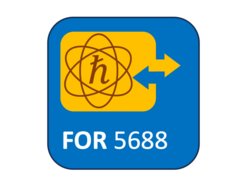FOR5688: Driven-dissipative many-body systems of ultracold atoms
This Research Unit is dedicated towards developing a better understanding of driven-dissipative quantum many-body systems with the goal of using dissipation as a novel tool for engineering complex low-entropy many-body states via cooling or projective measurements.

Open quantum systems are ubiquitous in nature. Whatever strong efforts an experimentalist may do to isolate a quantum system from its environment, a careful attention has to be paid to dissipation, in particular in view of applications in quantum science and technology. Fundamentally, dissipation results from the exchange of information, energy, and particles with the environment. These processes can play a detrimental role; however, the coupling to engineered reservoirs can also be a powerful tool for controlling a quantum system. Of special interest are so-called driven-dissipative systems, which approach a non-equilibrium steady state (NESS). Different from a thermal state, characterized by a few thermodynamic variables (like temperature) only, such NESSs depend on the details of the environment, opening ample opportunities for tailoring their properties.
Whether dissipation is a resource or a reality to be dealt with, it is crucial to have an accurate description of an open many-body system. However, theoretical modeling and simulation are challenging and rely on approximations. It is, therefore, highly desirable to build quantum simulators for open systems, with a well characterized and tunable environment. We will pursue this goal using ultracold atoms. This will allow us to deepen our understanding also of other open systems, to design novel control schemes, and to test and develop suitable theoretical approaches.
Ultracold atoms offer many opportunities. They are clean and can be manipulated and probed with high resolution both in space and time. Their high degree of isolation makes them excellent quantum simulators for closed systems. In close collaboration between theory and experiment, we will extend, explore, and exploit various possibilities for the controlled engineering of dissipation in these systems.
More information about our Research Unit, its members and planned events can be found on our website
This project is funded via the Deutsche Forschungsgemeinschaft (DFG, German Research Foundation) via Research Unit FOR5688 under project number 521530974.
